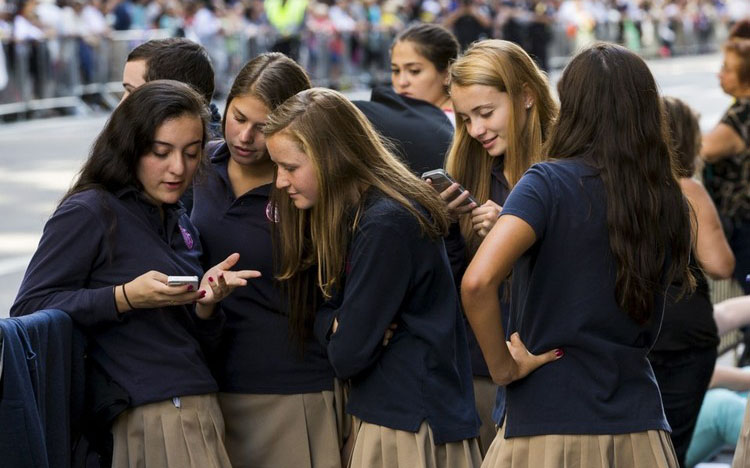Technology brings new concerns to teen dating abuse

 Kelsey Fischer has taught hundreds of Pierce County high school students how to recognise unhealthy relationships in a digital age.
Kelsey Fischer has taught hundreds of Pierce County high school students how to recognise unhealthy relationships in a digital age.
“It’s more common than we realise,” said Fisher, who shares in every presentation that one in three US adolescents has been a victim of physical, sexual, emotional or verbal abuse from a dating partner.
“I point that out to let teens know the magnitude of it. They think teen dating violence has to include physical abuse.”
But the YWCA youth advocate doesn’t need a national statistic to prove her point.
The proof is on a list Fischer keeps, with names and numbers of more than 50 Washington students who’ve asked for her help since she started speaking in local health classes last September.
“A good chunk of them will call because they are worried about a friend,” she said. “Usually, when they want to talk it’s because of something physically happening or they have questions like, ‘Does this count as abuse?’”
That’s sometimes a tricky question for Fischer to answer. Because while teen dating violence is an age-old problem, social media and technology have changed what it looks like in 2017.
“Cell phones are really playing a large part in how teens experience that pattern of control,” said Jennine Devenuti, education and prevention manager at YWCA Pierce County.
It’s common, youth advocates say, for the technology to create a lack of trust between partners, leading to unhealthy dating habits and potential abuse.
“The partner may be under surveillance, if you will. If one partner says ‘Hey, I’m at home with my mom,’ the other partner may say ‘Send me a picture right now. Check in. Let me know where you are.’”
Experts call it digital control — those relationships where one partner demands passwords, reads text messages and expects constant contact with their significant other.
“While the technology has changed, the dynamics haven’t. There didn’t use to be Snapchat or Instagram, but people were still finding a way to check up on each other to have control,” said Ilene Stohl, program coordinator at the Washington State Coalition Against Domestic Violence.
Last December, one of Fischer’s lectures at a Tacoma high school caught the attention of a 17-year-old girl in the second row.
“She was already concerned, and then hearing the information from the presentation really confirmed it. She wanted to talk after class,” Fischer said. She declined to name the teen due to confidentiality concerns.
The student was worried about her friend, who was dating a male student at the same school. She told Fischer that her friend felt significant pressure to immediately respond to her boyfriend’s texts.
That’s a red flag for experts who work with victims of teen dating violence.
“I hear a lot from young people that there’s this pressure to be instantly responsive because the consequences for not being responsive are pretty big,” Stohl said.
But it wasn’t just the texts that had the 17-year-old friend on watch.
“She noticed that (the boyfriend) checked in on her friend a lot,” Fischer said. “(The boyfriend) wouldn’t even let (his girlfriend) leave the classroom because he was worried that a guy would try to get with her in the brief time she would get a pass to go to the bathroom,” Fischer said.
“It was a textbook scenario of an unhealthy relationship.”
A Blurry Line
Sometimes, the line between normalcy and unhealthy behavior is much more difficult to draw — especially in an age when both nonstop texting and 24/7 responses are standard among young people and many adults.
“A lot of teens will push back on that and say ‘They check my phone, but I check theirs, too.’ We talk about being honest with yourself and ask ‘Are you absolutely OK with them checking your phone?’” Fischer said. “I think for some teens, it really can just be something common that they do, and not necessarily unhealthy.”
To Betsey Archambault, executive director of the Vashon DOVE Project, incessant texting can be a form of abuse.
“We have seen people that have come in here and they’re like ‘My boyfriend texted me 100 times in the past hour.’ That’s pretty full on. That’s not ‘Hey, how are you doing?’ That’s ‘What are you doing? Who are you doing it with? When you are leaving? When can I see you?’” she said.
But even when the line of abuse is clear to friends and family, experts say teenage victims in unhealthy relationships often can’t see there’s a problem.
“I think they sometimes see it as romantic and say ‘Wow, this person really loves me because they want all my attention and want me to focus only on them,”’ Fischer said.
Tracking Locations
Some teenagers will go to great lengths to track their significant other’s location, according to domestic violence experts who’ve watched the tactics unfold.
“There’s a lot of hacking into people’s accounts to read what they are writing to their friends, and to find out who they are with and what they are doing,” Archambault said.
She said teens in unhealthy relationships sometimes sign into mobile GPS trackers, too.
They use apps like “Find My iPhone” and “Find My Friends” to trace their girlfriend or boyfriend’s phone. They also monitor their partner’s social media profiles to see exactly when and where they “check in.”
“It’s a common and a fun thing for people to say (online): ‘I’m here having a milkshake.’ But that also lets the person who is stalking you or abusing you know exactly where you are,” she said.
Lessons For Parents
Experts say it’s important for parents to take note of any unusual behavioUrs involving their teenagers, their relationships and their digital devices.
“Let’s say you’re having dinner with the family and the teen will not put down the phone and the parent is like ‘Look, we’re having dinner. Put your phone away,’ and they get upset about it. (Understand that) there may be a consequence if they don’t answer that text,” Devenuti said.
But while it may be tempting to worry, she cautioned parents to not jump to conclusions without looking at the whole picture.
“Just because a parent sees their teen or their partner saying ‘Hey, who are you with?’ doesn’t necessarily mean the relationship is abusive,” she said. – Agencies.










Comments